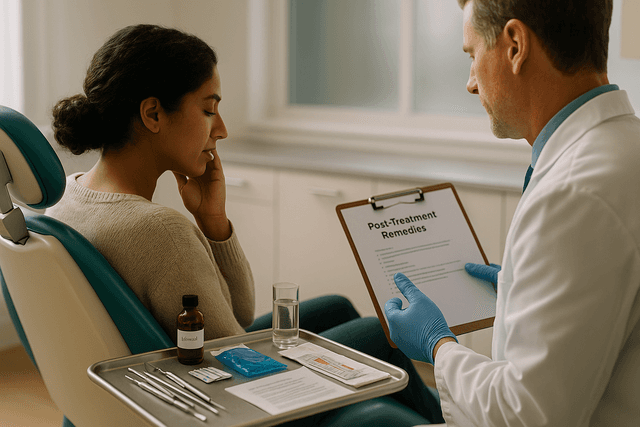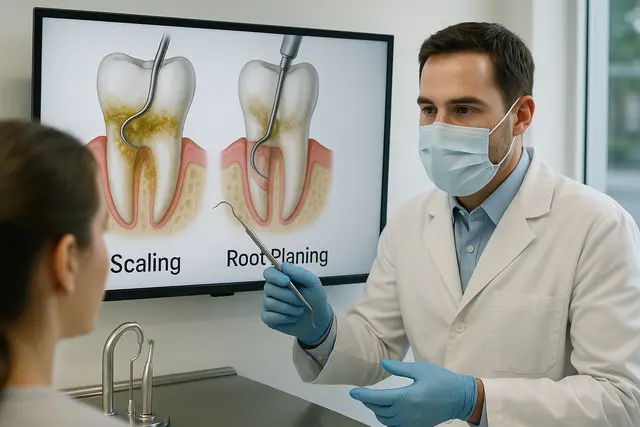General Dentistry
4 min read
Sep 08, 2025
Do Cavity Fillings Hurt After? What to Expect Post-Treatment
Tooth fillings are a routine dental procedure, but that doesn’t mean they’re without aftereffects. Many patients find themselves surprised by lingering discomfort or sensitivity once the anesthesia wears off. Understanding what’s normal, and what isn’t, can ease your mind and help you heal more comfortably.

So, you finally got that cavity filled. Congrats on taking care of your dental health! But now you’re sitting in your car, poking the inside of your mouth like an amateur archaeologist, wondering: why does my new filling feel weird? And more importantly, should it hurt this much?
What Exactly Is a Dental Filling?
First things first. A filling is a common dental procedure. It involves cleaning out tooth decay and sealing the hole with a filling material to protect the nerve inside the tooth. This helps restore your bite and preserve your tooth structure. Fillings are made of different materials, like composite resin, gold, or silver amalgam. The type of filling used can slightly affect how your tooth feels afterward.
During the procedure, your dentist numbs the tooth with a local anesthetic. That part’s easy. But once the numbness wears off, you might start to experience pain or discomfort. This doesn’t necessarily mean something went wrong. It’s often just your tooth adjusting to the new filling.
Why the Tooth May Hurt After
When a cavity is cleaned out, the dentist removes the decayed part of your tooth. If the cavity was deep or close to the nerve inside, that tooth might be extra sensitive for a while. Deeper fillings, especially those close to the nerve, can lead to short-term inflammation of the dental pulp, which is the soft center part of your tooth.
The result? Tooth pain after a filling that feels like a dull ache or sharp pain, especially when you bite or eat hot or cold foods.
Tooth Pain After a Filling and What’s Normal
Here’s the good news: some pain after a cavity filling is normal. It’s your tooth’s way of saying, “Hey, something changed here!”
You might feel:
Pain when biting or chewing
Some soreness in the surrounding tooth or gum area
This can last a few days or up to a couple of weeks. Just like you need time to break in new shoes, your tooth needs time to adjust to the new filling.
Dentist Tips to Relieve Tooth Pain After a Filling
If you experience tooth pain after a filling, try these dentist-approved tips to feel better faster:
Use over-the-counter pain relievers like ibuprofen
Avoid hot or cold foods that trigger sensitivity
Stick to soft foods if chewing is painful
Give your tooth time to heal and adapt
If your bite feels off, contact your dentist
Pain after a filling when chewing is often due to the filling being too high. A high filling can throw off your bite and cause pain in the tooth, jaw pain, or even headaches. The good news? Your dentist can adjust the filling in a quick, painless appointment.
Tooth Sensitivity and When to Worry
While sensitivity after a filling is common, there are moments when that post-filling pain might be a little too loud.
If you notice:
Sharp pain that doesn’t go away
Persistent pain more than two weeks after the filling
Worsening pain that keeps you up at night
Pain that spreads to your jaw or ear
These are signs something might be off. Sometimes, the nerve inside your tooth gets irritated during the filling procedure. This is especially true if the cavity was large or close to the nerve endings. In rare cases, this can lead to nerve irritation or even the need for a root canal.
Monitoring Your Filled Tooth
After getting a filling, the best thing you can do is stay alert and kind to your teeth. Be gentle with your bite, avoid biting hard objects (yes, even pens or ice), and keep up with good dental care.
Here’s a fun fact: a new filling can sometimes make surrounding teeth feel odd. This is because your bite has changed ever so slightly. But once your tooth adjusts to the new filling, everything should start feeling normal again.
Experience Pain Differently: Everyone’s Tooth Is Unique
Not everyone reacts the same way to getting a filling. Some people feel almost nothing afterward, while others experience tooth pain for a few days. If you have sensitive teeth or a history of tooth decay close to the nerve, you might feel more discomfort after a filling.
Even the material used can make a difference. For example, some people are more sensitive to metal fillings, while others do better with composite ones.
When to Call Your Dentist About Pain
Mild discomfort after a dental filling is common and often fades with a little TLC. Use over-the-counter pain relievers, avoid hot or cold foods, and give your tooth a few days to settle in.
But if your pain doesn’t improve, or if you notice worsening pain or pressure, reach out. A quick adjustment could save you from more dental procedures down the road.
Fillings are meant to protect your tooth and stop tooth decay in its tracks. So, if something feels off, don’t hesitate. Ensuring your tooth heals well is a big part of good dental care.
Is It Normal to Feel Pain After a Cavity Filling?
Yes, some discomfort after a filling is completely normal. Once the anesthetic wears off, your tooth may feel sore or sensitive, especially if the cavity was deep or close to the nerve. This sensitivity often shows up when eating hot, cold, or sweet foods, or when biting down. Typically, this discomfort fades within a few days to two weeks as your tooth adjusts to the new filling.
How Long Should Tooth Sensitivity Last After a Filling?
Tooth sensitivity can last anywhere from a couple of days to two weeks, depending on the size and depth of the filling, the material used, and how close it is to the nerve. Composite fillings often settle more quickly than metal ones. If sensitivity lasts longer than two weeks, or if the pain becomes more intense, it may be a sign the filling is too high or that the nerve inside the tooth is irritated.
When Should I Call My Dentist About Post-Filling Pain?
You should contact your dentist if you experience persistent pain that lasts more than two weeks, sharp pain that doesn’t improve, or pain that radiates to your jaw or ear. Other red flags include swelling, sensitivity that worsens over time, or pain that prevents normal chewing. In many cases, the issue may be a filling that sits too high and requires a simple adjustment, but it’s best to have your dentist confirm.
What Can I Do at Home to Relieve Pain After a Filling?
You can manage mild post-filling pain with over-the-counter pain relievers such as ibuprofen or acetaminophen. Avoid very hot, cold, or sticky foods that can trigger sensitivity. Stick to soft foods if chewing feels uncomfortable, and chew on the opposite side of your mouth when possible. Give your tooth time to heal, but if discomfort lingers or worsens, a quick visit to your dentist will help resolve the problem before it turns into something more serious.
Read Next
Related Posts

General Dentistry
How to Stop Nerve Pain in Tooth: Fast Relief That Works
Tooth nerve pain can be one of the most intense and disruptive types of discomfort. It often strikes without warning and makes everyday activities like eating, drinking, or even talking feel unbearable. Understanding what causes this pain and how to manage it effectively is key to getting fast relief.
4 min read
Sep 15, 2025

General Dentistry
Can a Sinus Infection Make Your Jaw Hurt? Understanding the Connection
Jaw pain can be unsettling, especially when it seems to appear out of nowhere alongside a stuffy nose or headache. Many people are surprised to learn that sinus infections can cause discomfort that feels like it’s coming from the jaw. Understanding the connection between your sinuses and jaw pain is key to getting the right treatment.
5 min read
Sep 15, 2025

General Dentistry
What Is SRP in Dentistry? A Complete Guide to Scaling and Root Planing
When it comes to dental health, most people think regular cleanings are enough to keep their smile safe. But sometimes, what’s happening below the gumline needs more attention. Scaling and root planing (SRP) is a treatment designed to address gum disease at its source, protecting both your gums and teeth from long-term damage.
5 min read
Sep 10, 2025
Don’t have time to research every dentist around you?
See why 30k+ patients trusted us